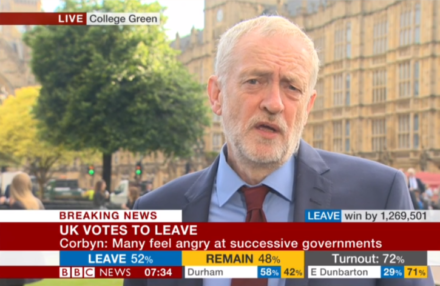
For a few brief days after the referendum the catastrophic consequences of Brexit sent a surge of energy around the Labour Party that seemed powerful enough to jolt Britain’s progressive politics into life again.
Among Labour MPs it immediately generated a new sense of clarity and urgency about ending the experimental party leadership of someone who had failed to convince people even which side he was on in the referendum.
And it was felt beyond Westminster too by people fearful for their future, suddenly desperate for an effective opposition to a hard Brexit and more ready to engage with Labour Party politics than at any point in their lifetime.
But that fragile connection between Labour and a power source bigger than either the current leadership or the PLP may already have been severed.
First came days of energy-sapping, time-wasting, Angela Eagle-damaging delay as negotiations between Tom Watson, the unions and Jeremy Corbyn meandered around behind locked doors in Westminster.
Then came Monday’s NEC meeting where Corbyn’s opponents tried and failed to get his name off the ballot paper before succeeding in banning new members from voting and raising the cost of registration eight-fold.
It reflected how many of those trying to remove Corbyn are operating with a plan drawn up long before the Brexit vote – and one remarkably unaffected by the referendum’s result.
Scarred by their experiences of last summer when Corbyn’s campaign recruited hundreds of thousands of new members and supporters – while other campaigns never really tried – their assumption is that the Labour mainstream can never be able to win an open ballot of the party’s grassroots against him.
So their conclusion has been that if Corbyn cannot be forced to resign or kept off the ballot paper, then ways have to be found to stop so many people voting.
This is a bleak view of the world which believes their best hope lies in seizing back control of the party apparatus through wheels and deals or the exercise of procedural manoeuvres in the dark.
It is not one shared by everyone who wants effective and electable leadership of the Labour Party. Some of us never understood how mainstream politicians whose job it is to win votes have become so defeatist in the face of an MP who has spent all but one of his 33 years in Parliament on the far left margins of the backbenches.
And their reluctance to sign up new party members in the aftermath of the referendum has been deeply depressing. For far too long the Saving Labour website did not even have a link asking people to join the party because it was more intent of capturing data for unspecified purposes in the future.
Despite such foot-dragging, tens of thousands of people from all walks of life have joined the party anyway in recent weeks with the intention of electing a better leader than the one we have.
Internal sampling conducted by party officials suggest that Corbyn’s supporters were only in a narrow majority of recent recruits and I will always wonder whether that proportion might have been reversed if the mainstream had done as much as to mobilise as Momentum.
I have friends who are celebrating what happened at the NEC on Monday as a tactical victory in the face of predictable intimidation from Momentum’s social media rent-a-mob. Part of me hopes they are right in believing the restrictions on new members will make it easier to defeat Corbyn in September.
But it still feels like a strategic defeat. Even if we succeed in removing Corbyn as leader, the price we will pay is the abandonment of any hope that we can build a mass membership party of the progressive mainstream.
The logic of what happened on Monday is that we should always be hiding from the membership, building barriers to entry, and stopping too many people from becoming too engaged with the party.
This would be a dessicated party with a rump of approved members who would be little more than a database for fundraising, automatons to knock on doors at elections and offer standing ovations at party conferences.
I am not suggesting this is what is desired by Angela Eagle or anyone else brave enough to put themselves up for election as a new leader of the party.
And, unlike many Corbyn supporters, Eagle and most of those behind Saving Labour still believe in a political project to change the country rather than just change the party.
If and when Corbyn has gone, they hope to revive the idea of an open and inclusive party where MPs exercise their right to ensure all leadership candidates receive a significant proportion of nominations from the parliamentary party.
Maybe. But even in their best case scenario, we are still wasting an extraordinary moment of political energy and engagement with the British people. And all this comes as Theresa May’s early statements – if not her Cabinet appointments – appear intent on filling the vacuum at the centre by stealing some of Ed Miliband’s better slogans.
Now more than ever we should be appealing far beyond the narrow confines of our party to all those who want to save our country. Instead, our best pitch is only to those interested in saving Labour. And that is never going to be “the many,” it will just be “the few”.
Tom Baldwin was senior advisor on communications and strategy to Labour leader Ed Miliband.



More from LabourList
‘National flags and identity can be inclusive – we’re right to embrace them’
Revealed: Claims of bullying, misogyny and harassment in Young Fabians
‘Sunak’s claim of a ‘sick note culture’ is immoral and deeply flawed’